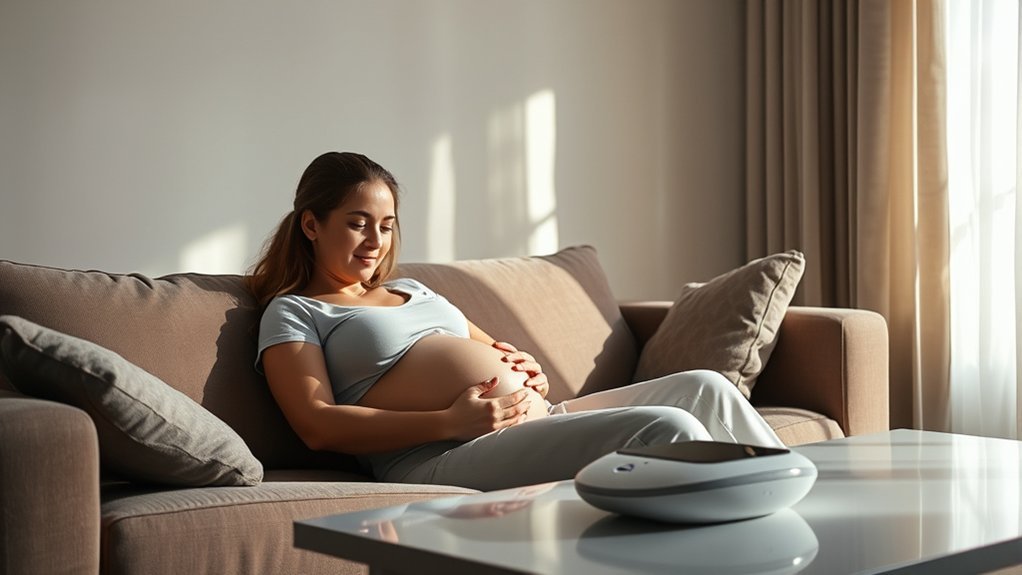Monitoring kick counts is essential for ensuring fetal well-being, recognizing patterns is vital, and responding to changes is imperative. Various factors can influence your baby’s movements, from natural sleep cycles to your own activity levels. Understanding these elements can help you identify when something might be amiss. It’s important to know the common causes of decreased activity and the risk factors that could impact your pregnancy. What signs should you watch for?
Understanding Kick Counts and Their Importance

Understanding kick counts is essential for monitoring your baby’s well-being during pregnancy. By tracking your baby’s movements, you can gain valuable insights into their health.
A consistent pattern of kicks indicates that your baby is active and thriving. You should aim to notice at least ten movements within two hours, typically during your baby’s most active times.
It’s important to remember that each baby is different; some may be more active than others. If you notice a significant decrease in movement or any unusual patterns, you should contact your healthcare provider immediately.
Monitoring kick counts not only fosters a deeper connection with your baby but also empowers you to advocate for their health and safety.
Factors Affecting Fetal Movement

Various factors can influence fetal movement throughout your pregnancy. Your baby’s activity can vary with gestational age; as they grow, movements often become more distinct.
Additionally, your own physical activity levels can affect how often you feel your baby move; a busy day might mask those gentle kicks. Maternal stress and anxiety can also impact fetal movement patterns, as stress hormones may influence your baby’s activity.
The time of day plays a role too; many women notice increased movement during the evening when they’re more relaxed. Furthermore, your nutrition can affect fetal energy levels; a balanced diet provides essential nutrients for healthy growth.
Being aware of these factors helps you understand your baby’s unique movement patterns, fostering a stronger connection.
Common Causes of Decreased Fetal Activity

While it’s natural to worry about your baby’s movements, several common causes can lead to decreased fetal activity. One significant factor is the baby’s sleep cycle; fetuses often have periods of rest that can last up to 20-40 minutes.
Additionally, your activity level can influence how much you feel your baby move. When you’re active, you might notice less movement, as the gentle rocking can lull your baby to sleep.
Dehydration can also play a role; a well-hydrated mother typically feels more fetal movement.
Finally, if you’re nearing your due date, your baby may have less room to move around, leading to reduced activity.
Always consult your healthcare provider if you have concerns about your baby’s movement.
Risk Factors Associated With Reduced Kick Counts
Several risk factors can contribute to reduced kick counts, which may signal potential issues with fetal well-being.
These factors include maternal obesity, which can affect placental function, and certain medical conditions like diabetes or hypertension that may impact fetal health.
Additionally, stress and anxiety can alter your body’s hormonal balance, potentially decreasing fetal movement.
Smoking or substance abuse during pregnancy also pose significant risks, as they can lead to impaired fetal development.
If you’re experiencing a decrease in fetal activity, it’s essential to take into account these factors and monitor your baby’s movements closely.
Staying informed about these risks allows you to better advocate for your health and your baby’s health during pregnancy.
When to Seek Medical Attention for Decreased Movement
If you’ve identified any risk factors associated with reduced kick counts, it’s important to know when to seek medical attention. Pay attention to significant changes in your baby’s movement patterns. If you notice fewer than ten movements in a two-hour period or a sudden decrease in activity, contact your healthcare provider immediately.
| Signs to Seek Help | Actions to Take |
|---|---|
| Less than 10 movements in 2 hours | Call your doctor or midwife |
| Sudden decrease in movement | Go to the nearest hospital |
| Any concerns about your baby’s health | Trust your instincts; seek immediate help |
Your well-being and your baby’s health are paramount. Don’t hesitate to reach out for guidance.
Frequently Asked Questions
How Can I Track My Baby’s Kick Counts Effectively?
You can track your baby’s kick counts effectively by choosing a specific time each day, noting movements, and using a journal or app to record them. Consistency helps you recognize patterns and any potential concerns.
Do Certain Foods Influence Fetal Movement?
Yes, certain foods can influence fetal movement. Consuming sugary snacks or cold drinks may stimulate your baby’s activity. Pay attention; tracking these movements after eating can help you understand your baby’s patterns better.
Can Stress Impact My Baby’s Activity Levels?
Yes, stress can impact your baby’s activity levels. High stress may lead to reduced movement or increased activity, as your baby responds to your emotional state. Monitoring these changes can be important for your well-being and your baby’s health.
Is There a Specific Time of Day for Kick Counts?
Yes, many expectant mothers notice their baby’s activity peaks during the evening or after meals. It’s helpful to monitor kicks during these times, as it can provide a clearer picture of your baby’s well-being.
Are There Any Cultural Practices Related to Monitoring Fetal Movement?
Many cultures emphasize observing fetal movements as a sign of well-being, often incorporating rituals or community support. You might find varying practices, but the central theme remains: fostering connection and awareness during pregnancy.
Conclusion
Just as a garden needs attentive care to flourish, so does your baby’s well-being. By monitoring kick counts, you’re nurturing this essential connection, ensuring that your little one is thriving. Remember, changes in movement can signal important shifts, much like the changing seasons. Don’t hesitate to reach out to your healthcare provider if you notice anything unusual—your vigilance is the sunlight that helps your baby’s health blossom. Trust your instincts; they’re often the best guide in this journey.
